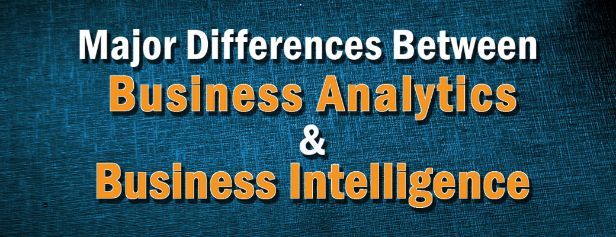Major Differences Between Business Analytics and Business Intelligence

Business analytics is a blend of technology and business that takes a data-driven approach, using data modeling and statistics to develop new business insights. It can be defined as software or business systems that make decisions for organizations by carefully analyzing relevant metrics. Simply put, it is the data-driven tools companies use to gain insight into past business performance to make the right decisions in the future.
Business analytics includes the use of descriptive, predictive and prescriptive analytics, while business intelligence uses only descriptive analytics. The general business analytics process can include data analysis, data modeling and statistics, business intelligence and business analytics. To break it down even further: Business intelligence includes data analysis itself, but only uses it as part of the entire process. Business analytics focuses on predictive and prescriptive analytics.
Both work similarly, but they have a few differences that can become a crucial point whether you use business analytics or business intelligence.
Business analytics refers to any data field that a company can use to make data-driven decisions. The two main components of business analytics can be further divided into three main categories: Business Intelligence, Business Data and Business Analytics.
In all areas of the company, things are changing and becoming more competitive, and this is the key to outperforming the competition. Business analytics is better than business intelligence when it comes to predictive and prescriptive analytics that point the way forward. As the fact that several companies already use business analytics shows, the value of such an analysis can offer a competitive advantage. It is also used to use prescription analytics to formulate optimization techniques for stronger business performance.
Big data and analytics can be used to make faster and more calculated decisions. A look at the industries that use business analytics on a daily basis will help you understand how analytics is used in a very practical way.
Business analytics offers companies in every industry a variety of benefits, but while each has its own approach, business intelligence and business analytics software provide valuable benefits to the companies that use it.
Business analytics helps businesses understand and use data better while Google Analytics helps small business owners make better, more informed decisions about their business.
If a company is unsure what to do with a large amount of data, business analytics can combine data with actionable insights to improve decision-making for the company. Business analytics helps you make decisions that end in comprehensive data charts, making decisions more interesting. Business intelligence and business analytic tools help companies of all sizes and industries make meaningful use of their data.
Effective business analytics informs users about what is currently happening in their organization and what they can do to adapt their business to optimize the value of the company. Business analytics gives companies insight into why this is happening and why not, how the company can become more efficient, and gives insight into which parts of the company are making improvements. These findings will enable such companies to automate their processes. While business intelligence helps companies manage and optimize their day-to-day operations, business analytics can pick up where BI left off and find ways to improve their future performance.
Before you consider the benefits of data analysis, it is important to understand what the term “business analytics” means to you.
Business analytics is the process of evaluating the wealth of data a company already has available and using it for data-driven decisions. Business analytics involves gathering and analyzing a wide range of information about your business and your customers. When an organization chooses to use business analytics, it inevitably makes better decisions in terms of revenue, customer experience, and overall efficiency. By getting to know your customers better and anticipating their ever-changing needs. Business analytics can help you maximize your dollars, get ahead of your competitors, and bring innovative ideas and products to market.
Business analytics affects your results in other ways, it helps you build a lead funnel and helps you build your lead funnel.
To learn more about Business Analytics visit Cougar Mountain Software!
